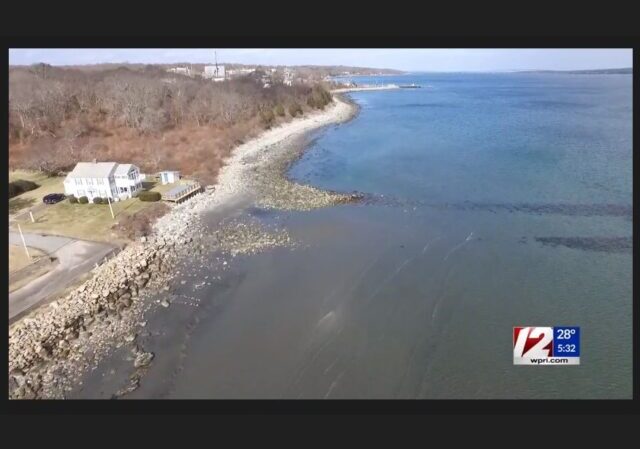Homeowners Mount New Challenge to Law ‘Taking’ Private Beachfront Property Without Compensation
The new lawsuit accuses Rhode Island of illegally seizing private land and usurping the authority of the state supreme court.

Rhode Island homeowners have sued in state court over a law that grants the public a right of access to their private beachfront property.
Opponents of the law previously challenged it in federal court, as Legal Insurrection reported. The federal judge dismissed that case, which asserted a violation of the U.S. Constitution’s prohibition on taking private land without compensation.
Within days of the dismissal, the Rhode Island Coastal Resources Management Counsel, a defendant, announced “a walking tour aimed at informing people on issues related to the new . . . law.”
Beautiful night for a walk and a chat about the new lateral shoreline access law! @rhodeislandsg @cleanoceanacces pic.twitter.com/1DN5GzGK84
— Rhode Island CRMC (@RI_CRMC) September 21, 2023
The state lawsuit includes additional claims, alleging the law violates a similar “takings” provision in the Rhode Island Constitution. The lawsuit also claims the law violates the separation of powers by purporting to overrule the state supreme court’s interpretation of the demarcation line between public and private beachfront property.
The dispute stems from a provision of the Rhode Island Constitution that ensures public shore access without defining the demarcation line between public and private property.
In 1982, the Rhode Island Supreme Court decided that the mean high tide (MHT) line, defined as “the arithmetic average of high-[tide] heights observed over an 18.6-year [lunar] cycle,” was the appropriate demarcation line between public and private property.
Under that decision, land seaward of the MHT line was public property, while land landward of the MHT remained private property. The new law, however, grants the public access to private beach property landward ten feet of the newly defined “recognizable high tide line,” which is “the water’s surface level at the maximum height reached by a rising tide.”
This redefinition, the lawsuit argues, “confiscates Plaintiffs’ properties, as well as the property of other owners of shorefront property in Rhode Island,” without compensation, violating the U.S. and Rhode Island Constitutions.
The lawsuit also argues the law’s attempt to overrule by statute the Rhode Island Supreme Court violates separation of powers. The state could only overrule the state supreme court, according to the lawsuit, by amending the state’s constitution.
Donations tax deductible
to the full extent allowed by law.








Comments
Redefining where public access begins on private property is unquestionably a taking. The basic foundation of property ownership is the right to exclude others from using your property. Whether these folks will be adequately compensated or compensated at all is a separate question. IMO, they should be. In this age of near zero accountability with a pervasive societal pressure at the top, on the left and from govt at all levels for little to no consequences for any actions they may not be.
The Supreme Court says that as long as the zoning change taking leaves at least 10% of the original property’s value, it’s not a taking. “Questions of valuation are extraordinarily difficult.”
Yes, Mar-a-Lago is only worth $18 million. (Taking 90% of a property’s value not being a “taking” is nuts.)
Government always assesses the value of a person’s property in a manner advantageous to itself.
This puts me in mind of Rush Limbaugh and his problems with Florida restricting the use of his (and others) oceanfront properties because of its effect on some sea turtles. Forgive me if I don’t remember the details.
I think I remember it having to do with lighting at night. Everyone was forced to shut off lights or make sure they were muted or something during hatching so the turtles wouldn’t go to the lights instead of the ocean
During laying season and hatching season lights must be off or in colors turtles can’t see –like amber or red.
That’s ‘enforced’ all along te gulf coast.
I think it is the low water mark in MA, which seems a bit more reasonable.
But lotsa luck walking in front of the Kennedy compound or Obama’s beach mansion on MV.
Maine and Massachusetts are the only two states in the nation where an oceanfront property “owns” to the low water mark, hence they have private beaches.
I wonder if the State did a ‘proper’ environmental impact study and statement of their intended actions.
The owners ought to try getting the EPA, Corps of Engineers, and definitely whatever greenie groups might be interested to have a look into the State’s plans if they haven’t done so already.
They might still lose but the owners can make it an almighty pain in the butt for the State and test the true political strength of its intentions.
Increasingly in this country destruction of the separation of powers may be anything from a hobby to a career path. Ownership of beachfront property may be the proxy in this case, and it may well be a demonstrable problem on, say, the New England coast where ten foot tides can expose either a quarter mile of “beachfront” or virtually none depending upon the slope of land. Nevertheless, the notions that what’s-yours-is-also-mine and everything-belongs-to-everyone seem to be growing problems. It’s exacerbated by increasing government ownership of “things” – property, systems, organizations, definitions, procedures, privacy, viewpoints, facts, truth – and the bureaucrats who claim ownership and management of them. It’s not a good thing.
It’s rampant socialism.
Sorry, it is the New World Order. You own nothing and you will be happy!
With the constant trampling of the 4 – 7 Amendments, this is no surprise.
And the elites own everything, and will be happier!
You own up to the mean high tide line.
10 feet landward is a taking.
Stipulate that those ten feet are for the purpose of crossing and you’re fine.
Who has been paying to refurb the beaches after storms?